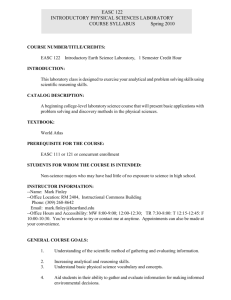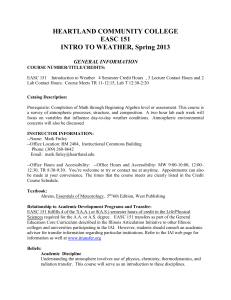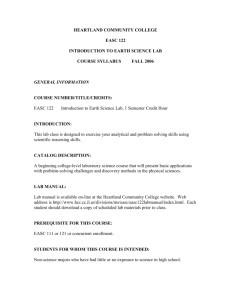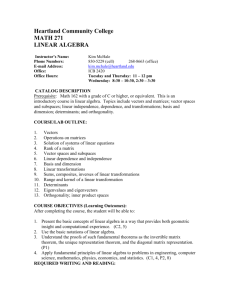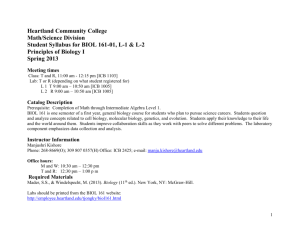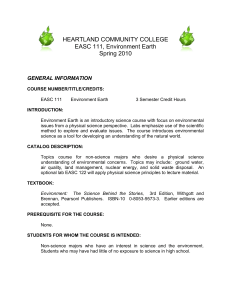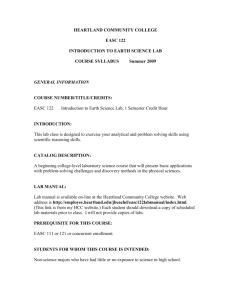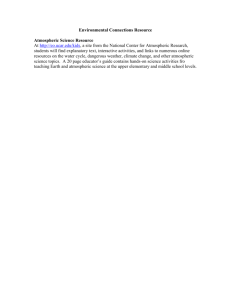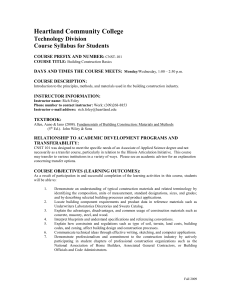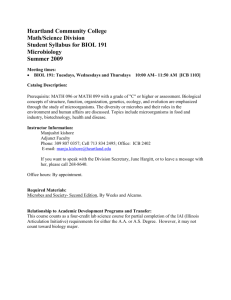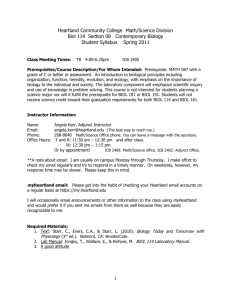EASC 151-01 Finley - Heartland Community College
advertisement
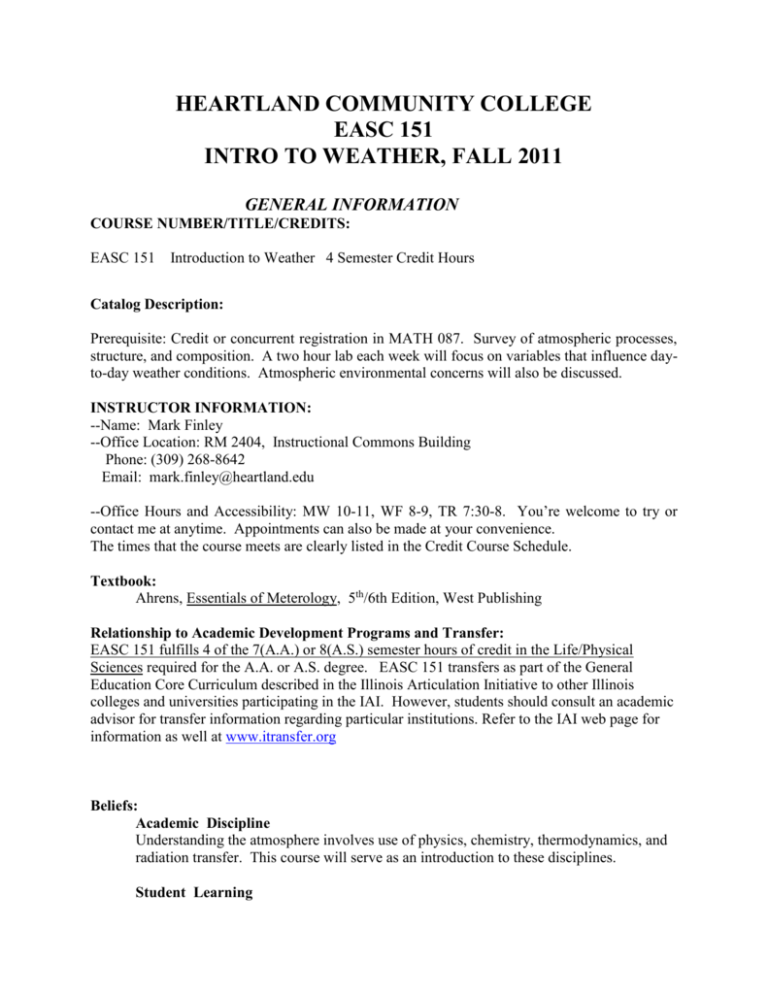
HEARTLAND COMMUNITY COLLEGE EASC 151 INTRO TO WEATHER, FALL 2011 GENERAL INFORMATION COURSE NUMBER/TITLE/CREDITS: EASC 151 Introduction to Weather 4 Semester Credit Hours Catalog Description: Prerequisite: Credit or concurrent registration in MATH 087. Survey of atmospheric processes, structure, and composition. A two hour lab each week will focus on variables that influence dayto-day weather conditions. Atmospheric environmental concerns will also be discussed. INSTRUCTOR INFORMATION: --Name: Mark Finley --Office Location: RM 2404, Instructional Commons Building Phone: (309) 268-8642 Email: mark.finley@heartland.edu --Office Hours and Accessibility: MW 10-11, WF 8-9, TR 7:30-8. You’re welcome to try or contact me at anytime. Appointments can also be made at your convenience. The times that the course meets are clearly listed in the Credit Course Schedule. Textbook: Ahrens, Essentials of Meterology, 5th/6th Edition, West Publishing Relationship to Academic Development Programs and Transfer: EASC 151 fulfills 4 of the 7(A.A.) or 8(A.S.) semester hours of credit in the Life/Physical Sciences required for the A.A. or A.S. degree. EASC 151 transfers as part of the General Education Core Curriculum described in the Illinois Articulation Initiative to other Illinois colleges and universities participating in the IAI. However, students should consult an academic advisor for transfer information regarding particular institutions. Refer to the IAI web page for information as well at www.itransfer.org Beliefs: Academic Discipline Understanding the atmosphere involves use of physics, chemistry, thermodynamics, and radiation transfer. This course will serve as an introduction to these disciplines. Student Learning Students must take an active role in the learning process or it will not take place. Desire and effort are the key ingredients in student success. Instructors Role The instructor is responsible for fostering an atmosphere conducive to learning, with the ultimate objective to develop student interest and to transfer knowledge. Course Objectives (Learning Outcomes): Upon successful completion of this course the student will: 1. 2. 3. 4. 5. Have a basic understanding of the processes at work in earth's atmosphere. Be familiar with the variables that go into weather forecasting. Appreciate the global stewardship necessary to maintain earth's atmosphere Understanding elements of severe weather. Evaluate man's impact of the atmosphere via computer modeling Course/Lab Outline: 1. Atmospheric composition and structure 2. Radiation 3. Heat and temperature 4. Heat Imbalance and weather 5. Pressure 6. Humidity, stability and clouds 7. Precipitation, weather modification and atmospheric optics 8. Atmospheric motion 9. Global circulation 10. Synoptic scale weather 11. Local and regional circulations 12. Thunderstorms 13. Tornadoes and Hurricanes 14. Forecasting Methods of Instruction: Lecture, discussion and laboratory. You will have the opportunity to ask questions and contribute to discussion throughout. Labs will provide an opportunity to explore concepts presented in the lecture. Course Policies: Method of Evaluation (Tests/Exams, Grading System): 100-90% 89-80% 79-70% 69-60% -60% A B C D F There will be five formal tests, and the lowest test score will be dropped. The remaining four tests are worth 70% of your final grade. No makeup tests will be given, if you miss a test that will be the test that you drop. Quizzes, homework, and labs will be worth 30%. late labs are accepted. NO TEXT MESSAGING DURING CLASS. Please leave class to text message. No Following these steps will assist the student in achieving success: A. Attend lectures and lab regularly. B. Participate in class discussions. Your ideas and thoughts are important. C. Ask questions when you do not understand or need something clarified. Take an active role in the learning process. D. Read the assigned material in the textbook before class. E. Review class notes. F. Review the key terms and questions for review at the end of the chapter. G. Turn in required materials on time. H. Attend labs ready to spend the entire lab period working. Participation (or Attendance) Regular class attendance is an important part of educational success and is expected of all students. Notice of Cancelled Class Sessions Cancelled class sessions, for all HCC classes, will be listed under Cancelled Class Meetings in the A-Z Index and under Academic Information in the Current Students page on the HCC Web site. Go to http://www.heartland.edu/classCancellations/ to learn what classes have been cancelled for that day and the upcoming week. Be sure to check the last column, which might contain a message from the instructor. Make-up of tests and assignments Labs must be turned in within one week of the lab period. There will be no test, quiz or lab makeups, if you miss a test that will be the test that you drop. Be on time for tests, you will not be allowed to take the test if you arrive after the first person has completed the test and left the room. Academic Integrity and Plagiarism Academic Integrity Academic integrity is a fundamental principle of collegial life at Heartland Community College and is essential to the credibility of the Colleges educational programs. Moreover, because grading may be competitive, students who misrepresent their academic work violate the right of their fellow students. The College, therefore, views any act of academic dishonest as a serious offense requiring disciplinary measures, including course failure, suspension, and even expulsion from the College. In addition, an act of academic dishonesty may have unforeseen effects far beyond any officially imposed penalties. Violations of academic integrity include, but are not limited to cheating, aiding or suborning cheating or other acts of academic dishonesty, plagiarism, misrepresentation of data, falsification of academic records or documents and unauthorized access to computerized academic or administrative records or systems. Definitions of these violations may be found in the college catalog. Plagiarism Plagiarism is the presenting of others ideas as if they were your own. When you write a paper, create a project, do a presentation or create anything original, it is assumed that all the work, except for that which is attributed to another author or creator, is your own. Plagiarism is considered a serious academic offense and may take the following forms: 1. 2. 3. 4. 5. Copying word-for-word from another source and not giving that source credit. Paraphrasing the work of another and not giving that source credit. Adopting a particularly apt phrase as your own Using an image or a copy of an image without crediting its source Paraphrasing someone else’s line of thinking in the development of a topic as if it were your own. 6. Receiving excessive help from a friend or elsewhere, or using another project as if it were your own. Note that word-for-word copying is not the only form of plagiarism. The penalties for plagiarism may be severe, ranging from failure on the particular piece of work, failure in the course or expulsion from school in extreme cases. [Adapted from the Modern Language Association=s MLA Handbook for Writers of Research Papers. New York: MLA, 1995: 26] SUPPORT SERVICES: Academic Support Center Services: HCC Portal Just a reminder that to access WebCT, IRIS, and your Heartland Student Email, you will need to log into myHeartland, at https://my.heartland.edu. Library The Library, located in the Student Commons Buildings at the Raab Road campus, provides Heartland students with a full range of resources including books, online journal databases, videos, newspapers, periodicals, reserves, and interlibrary loan. Librarians are available to assist in locating information. For more information, please call the Library (309) 268-8200 or (309) 268-8292 Tutoring Services Heartland Community College offers tutoring in various forms at no cost to Heartland students at the Tutoring and Testing Center in Normal and at the Pontiac and Lincoln Centers. Tutors are available at convenient times throughout the week. Study groups are also available by request. For more information about services available at each location, please call the Tutoring and Testing Center in Normal (309) at 268-8231, the Pontiac Center at (815) 842-6777, or the Lincoln Center at (217) 735-1731. Testing Services The Tutoring and Testing Center provides a secure testing environment for students who are enrolled in online, hybrid, and other distance learning courses; have a documented disability; or need to take a make-up exam. Testing accommodations for students having documented disabilities must be arranged by the student through the Office of Disability Services, and Testing Services will only administer make-up exams at the request of the instructor. Contact Testing Services at (309) 268-8231 for more information. Open Computing Lab The Open Computing Lab provides free computing for HCC students at convenient times throughout the week. The computer lab is staffed by trained Lab Assistants and offers the use of approximately 70 computers, a scanner, a laser printer, and an electric typewriter. SIGNIFICANT DATES: 6 Sept 24-26 Nov 3 Dec 4-10 Dec Labor Day Thanksgiving Break Last Day of Class (16 Week) Finals Week COURSE CALENDAR (subject to modification, weeks are estimates only) Chapter 1 - Weeks 1,2 - Overview, Vertical Structure 2 -Weeks 2,3 – Heat Transfer, Earth/Sun Relationships 3 -Week 4 – Seasons, Temperature TEST Chapter 4 – Weeks 5, 6 – Atmospheric Moisture, Clouds 5 – Week 7, 8 – Adiabatic Processes, Stability, Precip Types TEST Chapter 6 – Week 9- Pressure 7 – Week 10 – Atmospheric Circulations, Global and Local TEST Chapter 8 – Weeks 11, 12 – Air Masses and Fronts 9 – Week 13 – Forecasting Methods TEST Chapter 10 – Weeks 14, 15 – Thunderstorms, Severe Weather 11 – Week 16 - Hurricanes TEST LAB CALENDER (subject to modification) WEEK LAB 1 The Atmosphere, Vertical Structure of the Atmosphere 2 Temperature, Isopleths, Soil and Water Differential Heating 3 Seasons, Earth/Sun Relationships 4 Humidity Labs, Worksheet 5 Chapter Four Questions/Discussion 6 Adiabatic Lab 7 Pressure, Isobar Analysis 8 Upper Air Pressure Surfaces 9 Student Presentations/ Atmospheric Circulations 10 Fronts and Air Masses 11 Numerical Weather Prediction 12 Weather Forecasting 13 Forecast Discussions 14 Forecast Discussions 15 Forecast Discussions
